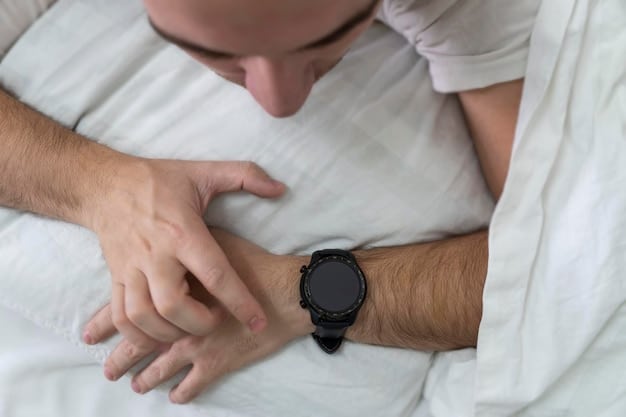Beat Jet Lag: A 3-Day Doctor-Approved Sleep Schedule Guide

Beating jet lag is achievable with strategic planning—a doctor-approved approach involves adjusting your sleep schedule three days before departure, optimizing light exposure, and staying hydrated to minimize travel fatigue.
Traveling across time zones can wreak havoc on your sleep schedule, leading to that dreaded feeling of jet lag. But what if you could minimize its impact and arrive at your destination feeling refreshed? This guide provides a doctor-approved strategy to beat jet lag by adjusting your sleep schedule in just three days.
Understand the Science Behind Jet Lag
Jet lag is more than just feeling tired after a long flight. It’s a physiological response that occurs when your body’s internal clock, or circadian rhythm, is disrupted. Understanding this disruption is the first step in effectively managing and minimizing its effects.
What Happens to Your Body’s Clock?
Your circadian rhythm is a roughly 24-hour cycle that governs various bodily functions, including sleep-wake patterns, hormone release, and body temperature. When you travel across multiple time zones, this internal clock becomes misaligned with the new environment.
Melatonin and Cortisol’s Role
Two key hormones heavily influenced by your circadian rhythm are melatonin and cortisol. Melatonin, often called the “sleep hormone,” promotes relaxation and helps you fall asleep. Cortisol, on the other hand, is a stress hormone that increases alertness. Jet lag disrupts the timing of these hormones, leading to sleep disturbances and feelings of fatigue.

To effectively tackle jet lag, consider these points:
- Circadian Rhythm Reset: The goal is to gradually shift your circadian rhythm to align with the time zone of your destination before you even arrive.
- Hormonal Balance: Strategies to promote melatonin production at the right time and manage cortisol levels can significantly reduce jet lag symptoms.
- Environmental Cues: Light exposure, meal times, and physical activity all play a role in influencing your body’s internal clock.
Understanding the underlying science of jet lag allows for a more informed and strategic approach to minimizing its impact, setting the stage for enjoying your travels without being sidelined by exhaustion.
Three Days Before: Gradual Sleep Adjustments
The most effective strategy to beat jet lag involves gradually adjusting your sleep schedule in the days leading up to your trip. This helps your body adapt to the new time zone before you even step on the plane, making the transition smoother and more manageable.
Calculate the Time Difference
First, determine the time difference between your departure location and your destination. This will help you calculate how much you need to shift your sleep schedule each day leading up to your trip. For example, if you’re traveling from New York to London (a 5-hour time difference), you’ll need to adjust your sleep schedule accordingly.
Phasing Your Sleep Schedule
Depending on whether you’re traveling east (losing hours) or west (gaining hours), adjust your bedtime and wake-up time in 30-minute to 1-hour increments each day. If traveling east, try going to bed and waking up earlier. If traveling west, shift your sleep schedule later.
Key considerations for phasing:
- Consistency is Key: Maintain your adjusted sleep schedule even on weekends leading up to your trip to reinforce the shift.
- Naps Strategically: Avoid long daytime naps, as they can interfere with your ability to adjust your sleep schedule. If needed, take short 20-30 minute naps.
- Monitor Your Body: Pay attention to how your body is responding to the adjustments. Some days may be easier than others, so be patient and flexible.
By making these gradual sleep adjustments in the days leading up to your trip, you’re setting yourself up for a smoother transition and minimizing the impact of jet lag on your overall travel experience.
Optimize Light Exposure
Light is one of the most powerful cues that regulate your circadian rhythm. Strategically managing your light exposure can significantly enhance your ability to adjust to a new time zone and overcome jet lag effectively.
The Science of Light and Your Internal Clock
Exposure to light, particularly sunlight, suppresses the production of melatonin and signals to your brain that it’s time to be awake and alert. Conversely, darkness promotes melatonin production and prepares your body for sleep. Understanding how light influences these processes allows you to manipulate your environment to better manage jet lag.
When to Seek and Avoid Light
The timing of light exposure is crucial. If you’re traveling east, seeking bright light in the morning at your destination can help you advance your circadian rhythm. Conversely, avoiding bright light in the evening can prevent delays in your sleep cycle. If you’re traveling west, the opposite applies: seek evening light and avoid morning light.

Here’s how to optimize light exposure:
- Morning Light: Expose yourself to bright light (preferably sunlight) for at least 30 minutes upon waking up in your destination.
- Evening Light: If traveling west, use light therapy devices or spend time outdoors in the evening to delay your sleep cycle.
- Blue Light Blockers: Minimize exposure to blue light from electronic devices (phones, tablets, computers) in the evenings, or use blue-light-blocking glasses.
By strategically managing your light exposure, you can powerfully influence your circadian rhythm and significantly reduce the severity of jet lag, ensuring a more enjoyable and productive travel experience.
Hydration and Nutrition Strategy
Staying well-hydrated and nourishing your body with the right foods can play a crucial role in minimizing the effects of jet lag. Proper hydration supports overall bodily functions, while strategic nutrition can help regulate your sleep-wake cycle and energy levels during travel.
Hydration is Key
Dehydration can exacerbate jet lag symptoms, leading to fatigue, headaches, and impaired cognitive function. Air travel, in particular, can be dehydrating due to the low humidity environment in airplane cabins. Drinking plenty of water before, during, and after your flight is essential to maintaining optimal hydration levels.
The Right Foods for the Right Time
Certain foods can help promote wakefulness, while others can induce relaxation and sleep. Consuming the right types of foods at the appropriate times can assist in adjusting your body clock to the new time zone.
Consider these tips:
- Avoid Alcohol and Caffeine: While tempting, alcohol and caffeine can disrupt your sleep patterns and dehydrate you. Limit or avoid these substances, especially close to bedtime.
- High-Protein Breakfasts: Start your day with a protein-rich breakfast to promote alertness. Eggs, yogurt, and nuts are excellent choices.
- Complex Carbohydrates at Night: Opt for complex carbohydrates like whole grains, fruits, and vegetables for dinner. These foods can help promote relaxation and sleep.
By prioritizing hydration and making strategic food choices, you can support your body’s natural processes and alleviate many of the unpleasant symptoms associated with jet lag. This will help you feel more energized, alert, and better prepared to enjoy your travels.
Strategic Use of Melatonin Supplements
Melatonin supplements can be a valuable tool in combating jet lag, particularly when used strategically. Melatonin helps regulate your sleep-wake cycle by signaling to your brain that it’s time to sleep. When taken correctly, it can aid in resetting your body’s internal clock and reducing the severity of jet lag.
Consult a Healthcare Professional
Before starting any supplement regimen, it’s crucial to consult with a healthcare professional. They can assess your overall health, consider any potential interactions with medications you’re taking, and provide personalized recommendations for melatonin dosage and timing.
Timing and Dosage
The key to effective melatonin use lies in timing and dosage. Generally, taking a small dose (0.5-3 mg) of melatonin a few hours before your desired bedtime at your destination can help shift your sleep cycle. Avoid taking it during the day, as this can disrupt your natural circadian rhythm.
Guidelines for Melatonin use:
- Start a Few Days Before: Begin taking melatonin a few days before your trip to help gradually adjust your sleep schedule to the new time zone.
- Consistency is Crucial: Take melatonin at the same time each night, even on days when you’re not traveling, to reinforce the shift in your body clock.
- Monitor Side Effects: Be aware of potential side effects, such as drowsiness, headaches, or dizziness. If you experience any adverse effects, discontinue use and consult with your healthcare provider.
With strategic timing and guidance from a healthcare professional, melatonin supplements can be an effective aid in minimizing jet lag and helping you adjust to new time zones more quickly and comfortably.
Adjusting on Arrival: Embrace the New Routine
One of the most effective strategies for overcoming jet lag is to quickly adapt to the routine of your new time zone upon arrival. This involves synchronizing your sleep schedule, meal times, and physical activities with the local pattern, helping your body realign its internal clock more efficiently.
Resist the Urge to Nap
While it may be tempting to take a long nap upon arrival, especially after a long flight, resist the urge. Napping for extended periods can disrupt your sleep schedule further and prolong the effects of jet lag. If you must nap, limit it to a short 20-30 minute “power nap” to refresh yourself without interfering with your nighttime sleep.
Regular Eating Times
Adjust your meal times to match the local schedule. Eating at the same times as the locals signals to your body that it’s time to be awake and active, helping to reset your circadian rhythm. Avoid eating large meals close to bedtime, as this can disrupt your sleep.
Important strategies to consider:
- Stay Active: Engage in physical activity during the day to help promote wakefulness and regulate your sleep-wake cycle. Exercise can also help reduce stress and improve overall mood.
- Hydrate Consistently: Continue to drink plenty of water throughout the day to stay hydrated and support your body’s functions.
- Seek Social Interaction: Spending time with others and engaging in social activities can help you stay alert and energized during the day.
By proactively integrating into the local routine upon arrival, you send clear signals to your body that it’s time to adjust. This can significantly reduce the duration and severity of jet lag, allowing you to enjoy your travel experience to the fullest.
| Key Point | Brief Description |
|---|---|
| ⏰ Gradual Sleep Adjustments | Shift your sleep schedule 30-60 minutes daily before your trip. |
| ☀️ Optimize Light Exposure | Seek light at strategic times to reset your circadian rhythm. |
| 💧 Hydration & Nutrition | Stay hydrated and consume foods that promote sleep or alertness. |
| 💊 Melatonin Use | Consider melatonin supplements to aid sleep, under doctor’s guidance. |
Frequently Asked Questions About Jet Lag
▼
Jet lag usually lasts about one day per time zone crossed. For instance, crossing three time zones might result in jet lag lasting around three days, but individual experiences can vary.
▼
Many people find jet lag worse when traveling east because it requires going to bed earlier, which can be harder than staying up later. Adapting to a shorter day is often more challenging.
▼
Yes, diet can play a role. Staying hydrated, avoiding alcohol and caffeine, and eating balanced meals can help. High-protein breakfasts and lighter, carb-rich dinners can promote better sleep.
▼
Melatonin is a common supplement that can help regulate sleep cycles. Consult with a doctor before using any medications or supplements to ensure they are safe and appropriate for you.
▼
Expose yourself to sunlight during the day, adjust your meal times to match the local schedule, stay active, and try to sleep at the appropriate local time. Consistency is key for rapid adjustment.
Conclusion
By implementing these doctor-approved strategies, you can significantly reduce the impact of jet lag and enjoy your travels to the fullest. Remember to gradually adjust your sleep schedule, optimize light exposure, stay hydrated, and consider strategic melatonin use. Safe travels!





